新概念英语第一册课文翻译及学习笔记Lesson115
(完整版)裕兴新概念第一册笔记(115-116)
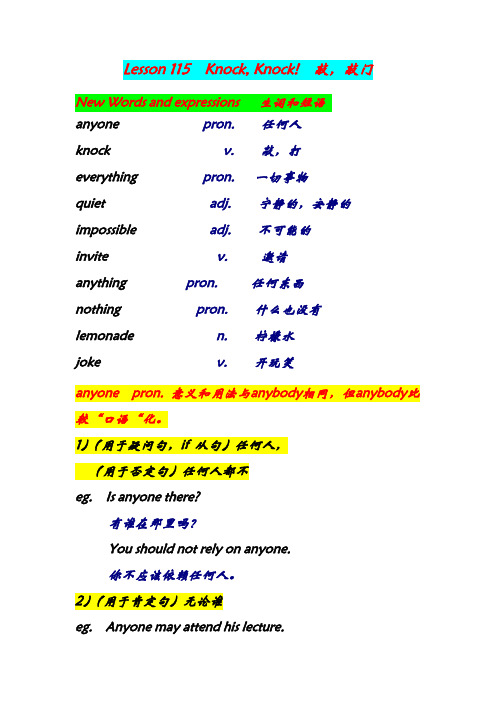
Lesson 115 Knock, Knock! 敲,敲门New Words and expressions 生词和短语anyone pron. 任何人knock v. 敲,打everything pron. 一切事物quiet adj. 宁静的,安静的impossible adj. 不可能的invite v. 邀请anything pron. 任何东西nothing pron. 什么也没有lemonade n. 柠檬水joke v. 开玩笑anyone pron. 意义和用法与anybody相同,但anybody比较“口语“化。
1)(用于疑问句,if 从句)任何人,(用于否定句)任何人都不eg. Is anyone there?有谁在那里吗?You should not rely on anyone.你不应该依赖任何人。
2)(用于肯定句)无论谁eg. Anyone may attend his lecture.任何人都可以听他演讲。
knock1) 敲,打eg. I knocked at the door, but there was no answer.我敲了门,但没有回应。
He came in without knocking.他没有敲门就近来了2)用力打,揍eg. He knocked me on the head.他打我的头。
3)以…碰撞…,碰撞eg. He knocked his leg against the desk.他的腿撞到了那张书桌。
The man knocked against me on purpose。
那个人故意撞我。
knock down 把(人)击倒,(车等)撞倒(人)eg. His son was knocked down by a car.他的儿子被汽车撞倒knock it off (口语)住手,住嘴everything pron. 一切事物,每样事物eg. Everything is good well.万事如意。
新概念第一册 115 116

11/15/2013
Don’t believe her, Jim. joking She is only_______.
Have some beer.
11/15/2013
Questions
Q1:what will Jim do? Q2: Is everything quiet? Q3: Is there anyone at home? Q4: Who invited Jim and Carol? Q5: What does Helen ask Jim to do? Q6: can Jim see anything? Q7: where do they go? Q8: Where are Tom and Carol?
❤anyone pron.
意义和用法与anybody相同 但anybody比较“口语“化。 (用于疑问句和否定句)任何人 有谁在那里吗? Is anyone there? 你不应该依赖任何人。 You should not rely on anyone. Anyone can’t tell this to her.
Nothing _________at all.
11/15/2013
Let’s try the back door.
Everyone’s Look! _____________in the garden.
11/15/2013
Hello, Helen. Hello, Tom.
Everybody ___________wants to have lunch in the garden. nice and warm out here It’s______________________.
新概念课堂笔记 第一册 Lesson 115-116
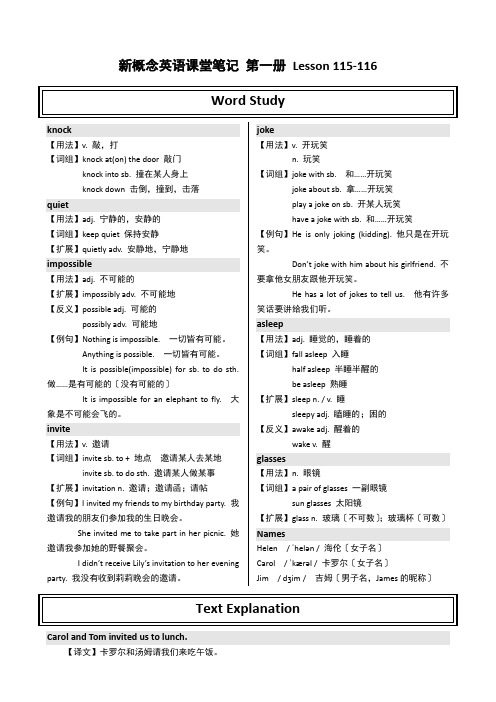
新概念英语课堂笔记第一册Lesson 115-116knock【用法】v. 敲,打【词组】knock at(on) the door 敲门knock into sb. 撞在某人身上knock down 击倒,撞到,击落quiet【用法】adj. 宁静的,安静的【词组】keep quiet 保持安静【扩展】quietly adv. 安静地,宁静地impossible【用法】adj. 不可能的【扩展】impossibly adv. 不可能地【反义】possible adj. 可能的possibly adv. 可能地【例句】Nothing is impossible. 一切皆有可能。
Anything is possible. 一切皆有可能。
It is possible(impossible) for sb. to do sth. 做……是有可能的〔没有可能的〕It is impossible for an elephant to fly. 大象是不可能会飞的。
invite【用法】v. 邀请【词组】invite sb. to + 地点邀请某人去某地invite sb. to do sth. 邀请某人做某事【扩展】invitation n. 邀请;邀请函;请帖【例句】I invited my friends to my birthday party. 我邀请我的朋友们参加我的生日晚会。
She invited me to take part in her picnic. 她邀请我参加她的野餐聚会。
I didn’t receive Lily’s invitation to her evening party. 我没有收到莉莉晚会的邀请。
joke【用法】v. 开玩笑n. 玩笑【词组】joke with sb. 和……开玩笑joke about sb. 拿……开玩笑play a joke on sb. 开某人玩笑have a joke with sb. 和……开玩笑【例句】He is only joking (kidding). 他只是在开玩笑。
新概念英语第一册课文翻译及学习笔记Lesson115

新概念英语第一册课文翻译及学习笔记Lesson115【课文】HELEN: Isn't there anyone at homeJIM: I'll knock again, Helen. Everything's very quiet. I'm sure there's no one at home.HELEN: But that's impossible. Carol and Tom invited us to lunch. Look through the window.HELEN: Can you see anythingJIM: Nothing at all.HELEN: Let's try the back door.JIM: Look! Everyone's in the garden.CAROL: Hello, Helen. Hello, Jim.TOM: Everybody wants to have lunch in the garden. It's nice and warm out here.CAROL: Come and have something to drink.JIM: Thanks, Carol. May I have a glass of beer pleaseCAROL: Beer There's none left. You can have some lemonade.JIM: Lemonade!TOM: Don't believe her, Jim. She's only joking. Have some beer!【课文翻译】海伦:家里没有人吗吉姆:海伦,我再敲一次。
毫无动静,肯定家里没有人。
海伦:但这是不可能的。
卡罗尔和汤姆请我们来吃午饭。
从窗子往里看看。
新概念一115和116课知识点整理

教材全解
教材全解
教材全解
1、Isn’t there anyone at home?家里没有人吗?
这是个否定疑问句。否定疑问句在翻译成中文的时候一般都是“难道...不...”或者“难道...没有...”的结构。Anyone用于否定及疑问句中,也可用于肯定句。
(2)something to +V原
例:something to drink一些喝的东西
something to eat一些吃的东西
something to play(with)一些玩的东西
5、There’s none left.一点都不剩下。
Left是leave的过去分词,修饰none,表示“剩下的,没用完的”。
安静得连针掉下去的声音都能听得见。
calm
平静的
The sea is calm.海面风平浪静。
peaceful
平静的,
安宁的
We want our children to live in a peaceful world.
我们希望我们的孩子们生活在安宁的世界里。
silent
无声的,
沉默的
Silent, please.
区别3(做简单了解)
none用于下列短语中:
have none of不接受(not accept);
none but只有(only);
none other than正是;
second to none首屈一指的(the best);
none the一点也不(用在比较级前)。
2、由some,any,no,和every构成的合成代词
新概念英语第一册115课

新概念英语第一册 115课① anyone pron.意义和用法与anybody相同但anybody比较“口语“化。
1)(用于疑问句和否定句)任何人eg: 有谁在那里吗你不应该依赖任何人。
(rely on)2)(用于肯定句)无论谁任何人都可以跟她学英语。
② everything pron. 一切事物,每样事物eg: 一切顺利告诉我整个事情的来龙去脉。
钱对他而言是最重要的东西。
她是我的一切。
修饰everything的形容词置于everything之后。
eg: 一切长的东西一切足够长的东西③ anything pron. 任何东西(疑问,否定句)任何事物,任何东西都不eg: 他说些什么了吗上个月公司有没有发生什么事你要不要喝点什么如果有什么我能帮你的,请告诉我。
我今天什么也没吃。
修饰anything 的形容词置于其后。
eg: 这里有没有什么东西新一点的anyone是不定代词,是由any和one组成的复合词,谓语用单数形式。
④nothing pron. 什么也没有。
eg: 关于那件事他什么也没说。
(about 关于)那车没有什么毛病。
没有任何事能改变他的心意。
--修饰nothing的形容词要置于其后。
Nothing interestinghave/ has nothing to do with sb. 与某人无关。
eg: 这件事跟我无关。
⑤knock1) 敲,打eg: 我敲了门,但没有回应。
eg: 下次进来之前请记得先敲门。
2)用力打,揍eg: 他打我的头。
3)以…碰撞…,碰撞eg: 他的腿撞到了那张书桌。
knock down 把(人)击倒,(车等)撞倒(人)eg: 一辆奔驰车把他的儿子撞倒了。
⑥ quiet1)宁静的,安静的一个寂静的夜晚我们想要一个安静一点的房间2)安祥的,安定的他在乡下过着悠闲安静的生活。
(live a …life过着…的生活)3)(人,性格等)稳重的,寡言的Ashleigh是个沉默寡言的人。
Lesson115-116笔记(素材)新概念英语第一册
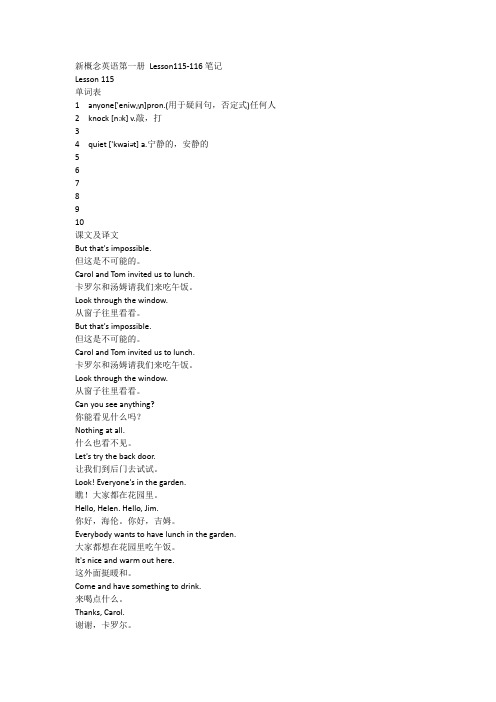
新概念英语第一册Lesson115-116笔记Lesson 115单词表1 anyone['eniwʌn]pron.(用于疑问句,否定式)任何人2 knock [nɔk] v.敲,打34 quiet ['kwaiət] a.宁静的,安静的5678910课文及译文But that's impossible.但这是不可能的。
Carol and Tom invited us to lunch.卡罗尔和汤姆请我们来吃午饭。
Look through the window.从窗子往里看看。
But that's impossible.但这是不可能的。
Carol and Tom invited us to lunch.卡罗尔和汤姆请我们来吃午饭。
Look through the window.从窗子往里看看。
Can you see anything?你能看见什么吗?Nothing at all.什么也看不见。
Let's try the back door.让我们到后门去试试。
Look! Everyone's in the garden.瞧!大家都在花园里。
Hello, Helen. Hello, Jim.你好,海伦。
你好,吉姆。
Everybody wants to have lunch in the garden.大家都想在花园里吃午饭。
It's nice and warm out here.这外面挺暖和。
Come and have something to drink.来喝点什么。
Thanks, Carol.谢谢,卡罗尔。
May I have a glass of beer please?给我一杯啤酒好吗?Beer?啤酒?There's none left.一点都不剩了。
You can have some lemonade.你可以喝点柠檬水。
Lemonade!柠檬水!Don't believe her, Jim.She's only joking.吉姆,别信她的。
新概念英语第一册自学笔记含课后练习答案:Lesson 115-116

新概念英语第一册自学笔记含课后练习答案:Lesson115-116新概念英语第一册115-116课课文重难点 further notes on thetext1.everything's =everything is.2.nothing at all.什么也看不见。
是省略句,承上句省略了 i see。
3.it's nice and warm out here.这外面挺暖和。
句中 it指天气。
nice and用于形容词或副词前增强语气,意为“很”、“十分”。
一般表示褒义,但有时也用于表示贬义。
4.there's none left.一点都不剩了。
句中的left是leave的过去分词,表示“剩下的”、“没用完的”。
它通常位于不定代词之后,出现在 there is/are结构中:there is nothing left in the refrigerator.冰箱中没剩下什么东西。
新概念英语第一册115-116课语法知识点 grammar in use不定代词(1)every(每一),no(无),any(若干)及some(一些)可与one,thing构成复合代词,与where构成复合副词。
不定代词可作主语、宾语和表语。
everynoanysomeeveryoneno oneanyonesomeoneeverybodynobodyanybodysomebody everythingnothinganythingsomething everywherenowhereanywheresomewhere请看例句:a作主语:这些代词作主语时都作单数看待,所以使用单数谓语动词。
everyone is asleep.大家都睡了。
everything is untidy.一切都乱糟糟的。
nobody has told me about it.没有人告诉过我相关这件事的情况。
b作宾语:i've got nothing to wear.我没有穿的衣服了。
(完整版)裕兴新概念第一册笔记(115-116)

New Words and expressions 生词和短语 anyone pron.任何人 knock v.敲,打 everythingpron. 一切事物quietadj. 宁静的,安静的 impossibleadj. 不可能的 invitev. 邀请 anythingpron. 任何东西 nothingpron. 什么也没有 lemonaden. 柠檬水 jokev. 开玩笑 anyone pron. 意义和用法与anybody 相同,但anybody 比 较“口语“化。
1)(用于疑问句, if 从句)任何人,用于否定句)任何人都不eg. Is anyone there? 有谁在那里吗? You should not rely onanyone. 你不应该依赖任何人。
2)(用于肯定句)无论谁eg. Anyone may attend his lecture.任何人都可以听他演讲。
eg. I knocked at the door, but there was no answer. 我敲了门,但没有回应。
He came in without knocking. 他没有敲门就近来了2)用力打,揍eg. He knocked me on the head.他打我的头。
3)以⋯碰撞⋯,碰撞eg. He knocked his leg against the desk. 他的腿撞到了那张书桌。
The man knocked against me on purpose。
那个人故意撞我。
eg. His son was knocked down by a car.他的儿子被汽车撞倒knock it off (口语)住手,住嘴everything pron. 一切事物,每样事物eg. Everything is good well.万事如意。
Tell me everything about it. 告诉我整个事情的来龙去脉。
新概念英语第一册第115课Lesson115课文单词知识点
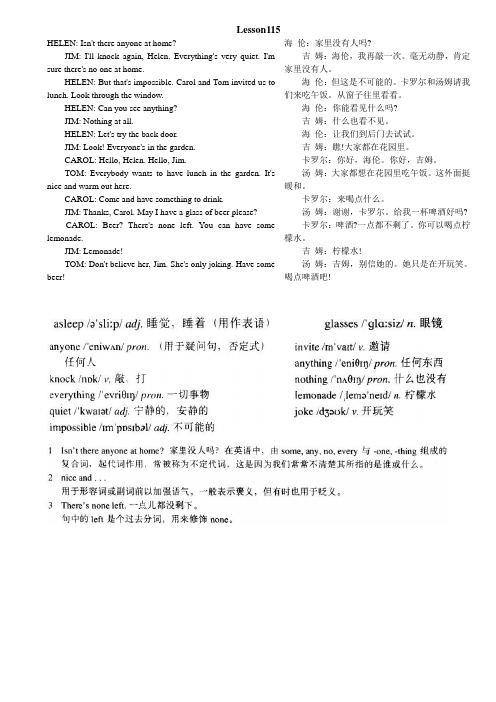
Lesson115HELEN: Isn't there anyone at home?JIM: I'll knock again, Helen. Everything's very quiet. I'm sure there's no one at home.HELEN: But that's impossible. Carol and Tom invited us to lunch. Look through the window.HELEN: Can you see anything?JIM: Nothing at all.HELEN: Let's try the back door.JIM: Look! Everyone's in the garden.CAROL: Hello, Helen. Hello, Jim.TOM: Everybody wants to have lunch in the garden. It's nice and warm out here.CAROL: Come and have something to drink.JIM: Thanks, Carol. May I have a glass of beer please?CAROL: Beer? There's none left. You can have some lemonade.JIM: Lemonade!TOM: Don't believe her, Jim. She's only joking. Have some beer! 海伦:家里没有人吗?吉姆:海伦,我再敲一次。
毫无动静,肯定家里没有人。
海伦:但这是不可能的。
卡罗尔和汤姆请我们来吃午饭。
从窗子往里看看。
海伦:你能看见什么吗?吉姆:什么也看不见。
新概念第一册113-115
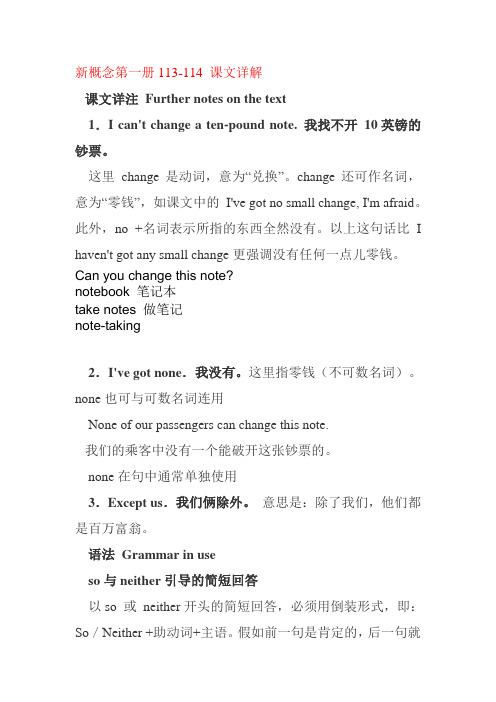
新概念第一册113-114 课文详解课文详注Further notes on the text1.I can't change a ten-pound note. 我找不开10英镑的钞票。
这里change是动词,意为“兑换”。
change还可作名词,意为“零钱”,如课文中的I've got no small change, I'm afraid。
此外,no +名词表示所指的东西全然没有。
以上这句话比I haven't got any small change更强调没有任何一点儿零钱。
Can you change this note?notebook 笔记本take notes 做笔记note-taking2.I've got none.我没有。
这里指零钱(不可数名词)。
none也可与可数名词连用None of our passengers can change this note.我们的乘客中没有一个能破开这张钞票的。
none在句中通常单独使用3.Except us.我们俩除外。
意思是:除了我们,他们都是百万富翁。
语法Grammar in useso与neither引导的简短回答以so 或neither开头的简短回答,必须用倒装形式,即:So/Neither +助动词+主语。
假如前一句是肯定的,后一句就用so开头;如前一句是否定的,后一句则用neither/nor开头。
前后两句的时态要一致。
词汇学习Word study1.change v.(1)兑换:I want to change the pounds into dollars.我想把这些英镑兑换成美元。
Could you change me a one-pound note, please?能否请你换一镑的零钱给我?(2)改变;更改:He changed his mind at last.他最终改变了自己的主意。
裕兴新概念英语第一册笔记:Lesson 115 Knock

Lesson 115 Knock, knock!New words and expressions:anyone pron. 任何人knock v.敲,打everything pron. 一切事物quiet adj. 宁静的,安静的impossible adj. 不可能的invite v.邀请anything pron. 任何东西nothing pron. 什么也没有lemonade n.柠檬水joke v.开玩笑anyone pron.意义和用法与anybody相同,但 anybody比较“口语”化。
1)(用于疑问句,if从句)任何人;(用于否定句)任何人都不。
eg. Is anyone there? 有谁在那里吗?eg. You should not rely on anyone. 你不应该依赖任何人。
2)(用于肯定句)无论谁eg. Anyone may attend his lecture. 任何人都可以听他演讲。
knock1)敲,打eg. I knocked at the door, but there was no answer.我敲了门,但没有回应。
eg. He came in without knocking. 他没有敲门就进来了。
2)用力打,揍eg. He knocked me on the head. 他打我的头。
3)以…碰撞…,碰撞eg. He knocked his leg against the desk.他的腿撞到了那张书桌。
eg. The man knocked against me on purpose.那个人故意撞我。
knock down 把(人)击倒;(车等)撞倒(人)eg. His son was knocked down by a car.他的儿子被汽车撞倒。
knock it off (口语)住手!住嘴!everything pron. 一切事物,每样事物eg. Everything is going well. 万事如意。
新概念英语第一册课文翻译及学习笔记Lesson115

新概念英语第一册课文翻译及学习笔记Lesson115新概念英语第一册课文翻译及学习笔记Lesson115【课文】HELEN: Isn't there anyone at home?JIM: I'll knock again, Helen. Everything's very quiet. I'm sure there's no one at home.HELEN: But that's impossible. Carol and Tom invited us to lunch. Look through the window.HELEN: Can you see anything?JIM: Nothing at all.HELEN: Let's try the back door.JIM: Look! Everyone's in the garden.CAROL: Hello, Helen. Hello, Jim.TOM: Everybody wants to have lunch in the garden. It's nice and warm out here.CAROL: Come and have something to drink.JIM: Thanks, Carol. May I have a glass of beer please?CAROL:Beer? There's none left. You can have some lemonade.JIM: Lemonade!TOM: Don't believe her, Jim. She's only joking. Have some beer!【课文翻译】海伦:家里没有人吗?吉姆:海伦,我再敲一次。
毫无动静,肯定家里没有人。
海伦:但这是不可能的。
新概念一115课课文

新概念一115课课文新概念英语是一套广泛使用的英语教材系列,其中包含了很多课文。
根据你的要求,我将为你提供新概念英语第一册第115课的课文。
课文如下:Lesson 115 The best and the worst.The best and the worst of all the things in the world are to be found in China. China is a very old country. There are few countries older than it. China is a very large country. There are few countries larger than it. China is also a very thickly populated country. There are few countries more thickly populated than it. China has a very long history. There are few countries with a longer history than it.The Chinese invented paper, gunpowder and printing. They knew how to make silk and tea long before any otherpeople did. They built the Great Wall, which is the only man-made structure that can be seen from the moon.The Chinese have a saying: "The best things are small things." They like small things. They like small houses, small trees and small gardens. They like small pictures and small pieces of jade. They like little children. They even like little dogs and little birds.The Chinese have another saying: "The worst things are big things." They do not like big things. They do not like big houses, big trees or big gardens. They do not like big pictures or big pieces of jade. They do not like big children. They do not like big dogs or big birds.The Chinese like small things because small things are often more beautiful than big things. A small house with a small garden is more beautiful than a big house with a big garden. A small picture is often more beautiful than a big picture. A small piece of jade is often more beautiful than a big piece of jade.The Chinese do not like big things because big things are often less beautiful than small things. A big house with a big garden is often less beautiful than a small house with a small garden. A big picture is often less beautiful than a small picture. A big piece of jade is often less beautiful than a small piece of jade.The Chinese also do not like big things because big things are often dangerous. A big dog is often dangerous. A big bird is often dangerous. A big tree is often dangerous. The Chinese do not like danger.So, the best and the worst of all the things in the world are to be found in China. This is because the Chinese like small things and do not like big things.以上就是新概念英语第一册第115课的课文内容。
新概念一册第115课课文讲解

新概念一册第115课课文讲解一、词汇讲解。
1. anyone /ˈeniwʌn/- 代词,“任何人”,用于疑问句和否定句中,相当于anybody。
例如:Is there anyone at home?(家里有人吗?)2. knock /nɒk/- 不及物动词,“敲(门、窗等)”,常与at或on搭配。
例如:Knock at the door before you enter.(进屋之前先敲门。
)- 名词,“敲击声;敲门声”。
例如:I heard a knock at the door.(我听到了敲门声。
)3. everything /ˈevriθɪŋ/- 代词,“一切事物;每样事物”。
例如:Everything is ready.(一切都准备好了。
)4. quiet /ˈkwaɪət/- 形容词,“安静的;宁静的”。
例如:Keep quiet in the library.(在图书馆里保持安静。
)- 名词,“安静;寂静”。
例如:I like the quiet of the countryside.(我喜欢乡村的宁静。
)5. impossible /ɪmˈpɒsəbl/- 形容词,“不可能的;办不到的”。
例如:It is impossible for me to finish this work in one day.(对我来说一天完成这项工作是不可能的。
)6. invite /ɪnˈvaɪt/- 及物动词,“邀请”。
例如:I will invite my friends to my birthday party.(我将邀请我的朋友们参加我的生日聚会。
)7. anything /ˈeniθɪŋ/- 代词,“任何事物;任何东西”,用于疑问句和否定句中。
例如:I don't want anything to drink.(我不想喝任何东西。
)8. nothing /ˈnʌθɪŋ/- 代词,“没有什么;没有东西”。
新概念英语第一册课文翻译及学习笔记Lesson111~116

新概念英语第一册课文翻译及学习笔记Lesson111~116新概念英语第一册课文翻译及学习笔记Lesson111~112【课文】MR.FRITH:I like this television very much. How much does it cost?ASSISTANT:It's the most expensive model in the shop. It costs five hundred pounds.MRS. FRITH:That's too expensive for us. We can't afford all that money.ASSISTANT:This model's less expensive than that one.It's only three hundred pounds. But, of course, it's not as good as the expensive one.MR. FRITH: I don't like this model. The other model's more expensive, but it's worth the money.MR. FRITH: Can we buy it on instalments?ASSISTANT:Of course. You can pay a deposit of thirty pounds, and then fourteen pounds a month for three years.MR. FRITH:Do you like it, dear?MRS. FRITH:I certainly do, but I don't like the price. You always want the best, but we can't afford it. Sometimes you think you're a millionaire!MR.FRITH:Millionaires don't buy things on instalments!【课文翻译】弗里斯先生:我非常喜欢这台电视机。
- 1、下载文档前请自行甄别文档内容的完整性,平台不提供额外的编辑、内容补充、找答案等附加服务。
- 2、"仅部分预览"的文档,不可在线预览部分如存在完整性等问题,可反馈申请退款(可完整预览的文档不适用该条件!)。
- 3、如文档侵犯您的权益,请联系客服反馈,我们会尽快为您处理(人工客服工作时间:9:00-18:30)。
新概念英语第一册课文翻译及学习笔记Lesson115【课文】
HELEN: Isn't there anyone at home
JIM: I'll knock again, Helen. Everything's very quiet. I'm sure there's no one at home.
HELEN: But that's impossible. Carol and Tom invited us to lunch. Look through the window.
HELEN: Can you see anything
JIM: Nothing at all.
HELEN: Let's try the back door.
JIM: Look! Everyone's in the garden.
CAROL: Hello, Helen. Hello, Jim.
<
TOM: Everybody wants to have lunch in the garden. It's nice and warm out here.
CAROL: Come and have something to drink.
JIM: Thanks, Carol. May I have a glass of beer please
CAROL: Beer There's none left. You can have some lemonade.
JIM: Lemonade!
TOM: Don't believe her, Jim. She's only joking. Have some beer!
【课文翻译】
海伦:家里没有人吗
吉姆:海伦,我再敲一次。
毫无动静,肯定家里没有人。
海伦:但这是不可能的。
卡罗尔和汤姆请我们来吃午饭。
从窗子往里看看。
~
海伦:你能看见什么吗
吉姆:什么也看不见。
海伦:让我们到后门去试试。
吉姆:瞧!大家都在花园里。
卡罗尔:你好,海伦。
你好,吉姆。
汤姆:大家都想在花园里吃午饭。
这外面挺暖和。
卡罗尔:来喝点什么。
汤姆:谢谢,卡罗尔。
给我一杯啤酒好吗
卡罗尔:啤酒一点都不剩了。
你能够喝点柠檬水。
吉姆:柠檬水!
*
汤姆:吉姆,别信她的。
她仅仅在开玩笑。
喝点啤酒吧!
【生词】
anyone pron.(用于疑问句,否定句)任何人
knock v. 敲,打
everything pron.一切事情
quiet adj. 宁静的,安静的
impossible adj. 不可能的
invite v. 邀请
anything pron.任何东西
nothing pron.什么也没有
~
lemonade n. 柠檬水
joke v. 开玩笑
【知识点讲解】
(一)单词扩展
1. knock v. 敲,打 knock at the door 敲门
2. quiet adj. 平静的,安静的 quietly adv. 安静地
3. impossible adj. 不可能的反义词 possible adj. 可能的
Adidas的广告语Impossible is nothing “没有不可能”
4. invite v.邀请 invite sb to lunch/dinner 请某人吃午饭/晚餐
invitation n. 邀请
]
5. joke v. 开玩笑常用口语: Are you joking你不是在开玩笑吧
(二)不定代词的用法
本课中集中出现了较多的不定代词。
所谓的不定代词就是由some,any,no, every与-one,-thing,-body组成的复合词,在句子中起代词的作用。
但因为这些词,具体指代什么,并不清楚,所以就称为不定代词。
规律:
1. 这些不定代词做主语时,均视为单数。
2. 一般来说,由any组成的不定代词,通常放在疑问句,否定句中。
而由some组成的不定代词则放在肯定句中。
但希望别人不要拒绝某种邀请时,能够用some来代替any组成的代词。
Would you like some orange想来点橙汁吗(言下之意:请你不要拒绝。
)
3. 由any,some,no,every组成的不定代词,还是保留了它们的含义。
如:any(任何),anything,任何东西,anybody 任何人,anyone 任何人;some(某...) somebody/someone 某人, something,某事,以此类推,every(每...) no (没有...)
(三)省略句的用法
在113课时,我提到了省略句,并要求大家去找找这个课有多少个省略句。
你找到了吗
今天我们具体来讲讲,省略句的用法:
|
1. 省略句,就是别人在称述某种现象或观点时,你表示赞同,或你也有如此经历时,所用的一种表达。
. A:I like watching TV very much. B可能会说:I like watching TV very much, too.但更多的时候,我们不必要再把别人的话,原原本本地重复一遍。
这是省略句就能够大展拳脚了。
2. 省略句的用法:
1)肯定句后的省略句。
So+be动词/助动词/情态动词+主语。
肯定句中如果有be动词,确定好时态后,省略句用So+be动词+主语的结构;如果肯定句中没有be动词,就得借助助动词了。
选择助动词的选择,取决于肯定句的时态。
如果句子中有情态动词(can,could,may,must等),省略句的格式为so+情态动词+主语。
例如:
be动词:
A:I am a student. (有be动词,一般现在时) B: So am I/So is my sister.
A:I was 16 years old. (有be动词,一般过去时)B:So was I/So was my sister.
助动词:
A:I like watching TV very much.(一般现在时) B:So do I./So does my sister. (do, does,一般现在时的助动词,但要根据省略句的主语变化而变)
A:I went to Beijing last summer.(一般过去时) B:So did I./So did my sister.
情态动词:
A:I can swim as fast as Liuxiang. B: So can I/so can my sister.(情态动词不需要做任何变化)
2)否定句后的省略句。
Neither+be动词/助动词/情态动词+主语。
(具体be动词、助动词,情态动词的变化与肯定句后的省略句相同)
A:I am not a student. B: Neither am I./Neither is my sister.
A:I don't like watching TV very much. B: Neither do I./Neither does my sister.。
